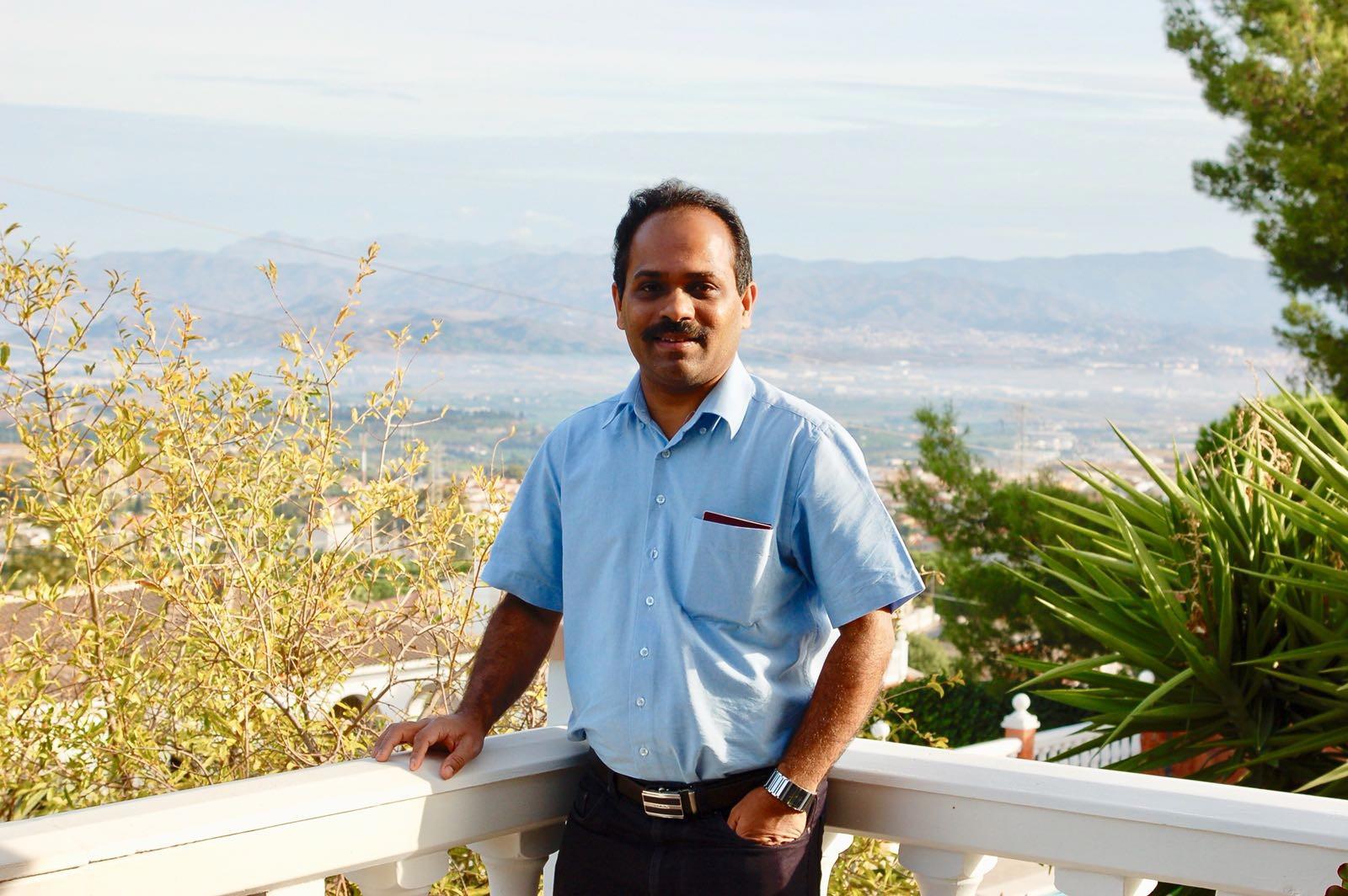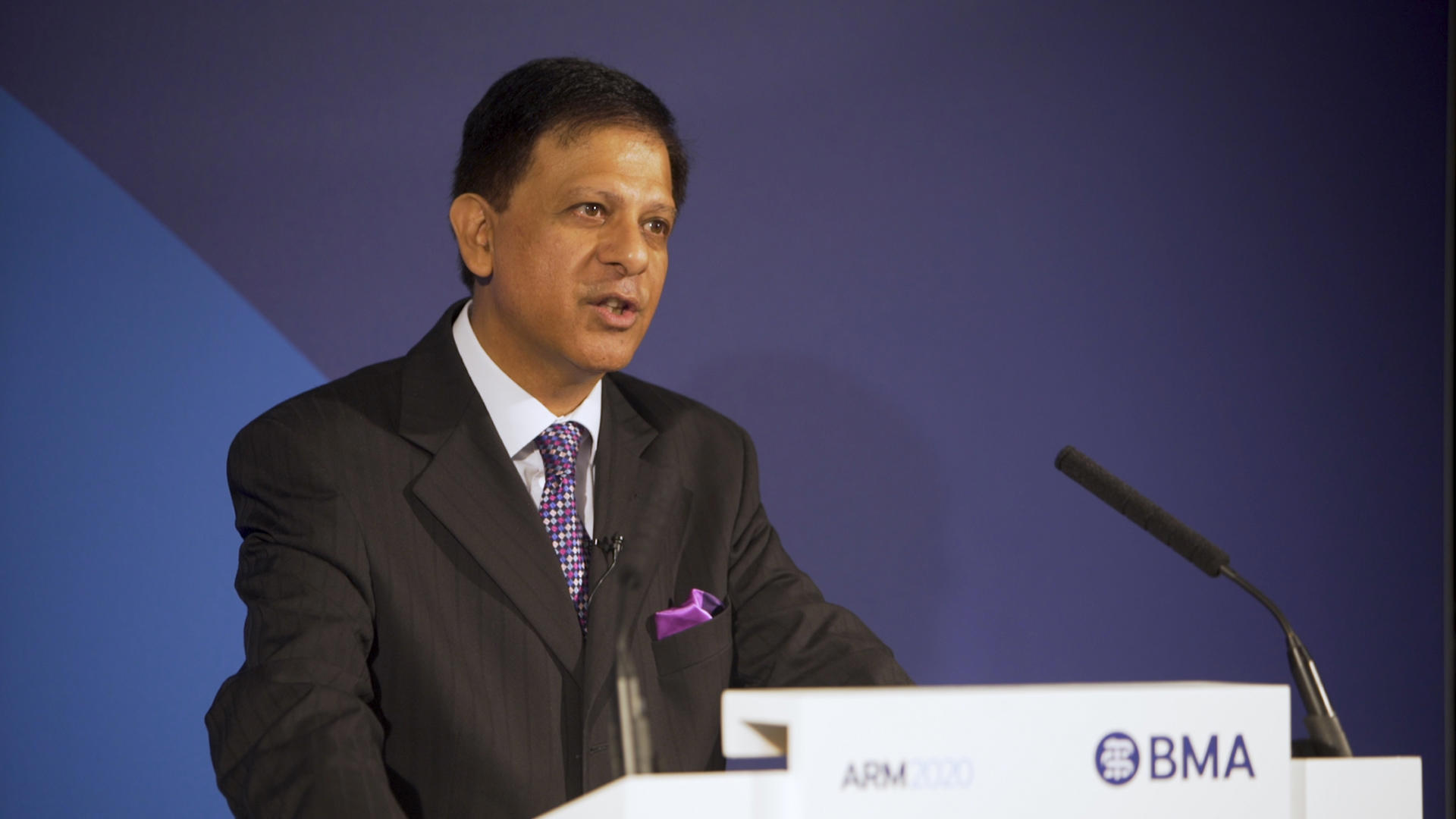‘I never even dreamt or thought that this could happen in my home – and especially to my husband. Definitely, this decision that has come out of him is not his own. He must have been shattered by seeing that letter.’
On 2 May 2018, Sridharan Suresh, a consultant anaesthetist at North Tees and Hartlepool Hospitals NHS Foundation Trust – a doctor with an ‘exceptional, unblemished’ professional record – received a letter from the GMC informing him he would be subject to an interim orders tribunal.
Dr Suresh had been under police investigation at the time following allegations of sexual touching made by a teenage patient undergoing sedation for dental extraction – although an inquest into his death last year heard that the drugs used to sedate the patient are ‘well-known’ to produce hallucinations and heightened sexual feelings, the description the victim gave did not match Dr Suresh’s appearance and the police later closed the case with ‘insufficient evidence’.
Dr Suresh had been told by his trust he would not be referred to the GMC, but the police made a third-party referral and the trust did not inform Dr Suresh, despite knowing the action had been taken.
‘Shockwave’
The letter came as a ‘bolt from the blue’. Just hours later Dr Suresh sent an email to his wife saying he had done nothing wrong, but could go on no longer, and took his own life.
Speaking to The Doctor, Dr Suresh’s widow, Viji Suresh (pictured, top), says: ‘He was on his own, he was alone, there was nobody there with him. The amount of impact it had – it was a kind of shockwave. His mind was not in the right place.
‘For me it is an irreplaceable loss and causes me extreme anger and disappointment.’
Mrs Suresh’s medico-legal adviser Rajendra Chaudhary says: ‘I didn’t know Dr Suresh but when I see that letter myself it hits me how this would have panned out in his mind.
'Doctors see the GMC as a very cold, unsympathetic organisation, and that they have no concern whatsoever about doctors’ wellbeing. You feel you become guilty before you have been tried.’
Stress of inquiry
GMC figures show that in 2019 there were 8,654 fitness-to-practise enquiries – the majority from members of the public. Of those 1,389 extended to a full investigation, 602 to a provisional inquiry and 365 ended in a referral to a responsible officer.
The significant majority, 6,298, were closed prior to those stages at ‘initial triage’.
And it is clear that the effect of each and every one of these processes can be huge.
A West Midlands GP, who asked to remain anonymous, told The Doctor the stress of even the initial, six-week in his case, inquiry ahead of a potential investigation had a huge impact – and led to him taking medication to block obsessional thoughts and emotions.
He says: ‘It affected every grain of me in terms of what I did in the workplace. I had repetitive, intrusive thoughts and anxiety and it just wouldn’t go away. I constantly worried about everything else that happened, other patients I had seen and I was constantly looking back and analysing things I had done. On top of that I worried about losing my job and becoming destitute and all those sorts of things.’
He adds: ‘I ask myself – “would I have had the resilience to persevere knowing how long this process would take?”
It is an irreplaceable loss and causes me extreme anger and disappointmentViji Suresh
I don’t think I would have had the armoury to cope with that at that point.’
The effects of these processes should not be a surprise to the regulator, either. It has even investigated the link between doctor suicide and fitness-to-practise investigations itself, before.
In 2014 the GMC commissioned an independent review from Sarndrah Horsfall, which identified 28 suicide – or suspected suicide – cases among doctors under investigation between 2005 and 2013.
Manchester University professor of psychiatry Louis Appleby was subsequently tasked with analysing the impact of GMC investigations on doctors and coming up with proposals to lessen those impacts.
He said at the time that ‘suicide is not confined to those who are known to be mentally ill – it can be those who are thought to be coping that are most at risk – so reducing risk is a task for the system as a whole’.
Heavy-handed response
Speaking to The Doctor, Professor Appleby says doctors under investigation can feel trapped, humiliated and unjustly treated – three ingredients for a recipe of great concern.
He adds: ‘Sometimes the response in the system can seem disproportionate when doctors start to see not just a threat to their livelihoods and professional standing but something much more profound about who they are.’
The GMC says it made a number of changes following the review, including only carrying out formal investigations ‘where necessary’, ‘coordinating’ approaches so doctors under investigation has a single point of contact, ‘improving’ communications with doctors, and establishing a specialist team to handle cases where doctors are unwell.
Doctors see the GMC as a very cold, unsympathetic organisationRajendra Chaudhary
All of these changes were made prior to the death of Dr Suresh and he was not identified as vulnerable. It seems the GMC would likely need something as clear cut as an obvious diagnosis of mental ill health in order to trigger any particular concern or extra layer of compassion.
Professor Appleby says: ‘The gap that leaves – an important gap – is that sometimes people who feel that sense of humiliation or being unjustly treated might not have a mental disorder.
'That is, to some extent, a natural reaction of the high-standard, perfectionist, professional challenged about the work they do and in which their identity is wrapped up. It’s very important we don’t just see suicide risk as just in those people who have got a specific mental disorder. It also applies to other people who may not be depressed in a clinical sense but are becoming a risk because of these factors and these reactions to the process.’
 DEVASTATION: Dr Suresh took his own life after GMC contact
DEVASTATION: Dr Suresh took his own life after GMC contact
As Dr Chaudhary says: ‘I personally feel it was quite foreseeable that there was a high risk of self-harm at this point – particularly for someone facing those allegations already.’
The BMA is supporting Dr Suresh’s family in a claim for damages and other relief brought under the Human Rights Act 1998, the law of negligence under the provisions of the Fatal Accidents Act 1976 and under the Law Reform (Miscellaneous Provisions) Act 1934.
Risk awareness
A letter before action will be sent to the GMC outlining the details of the case. It says the GMC should have known there was a real and immediate risk of suicide, and that there were system failures after the GMC failed to take any steps to liaise with Dr Suresh’s employer or the police to assess his vulnerabilities, despite Dr Suresh telling his trust how the investigations were affecting him and his family.
The letter outlines that the GMC’s communication with Dr Suresh on 2 May 2018 was impersonal despite the GMC suggesting it has improved these processes. It also says the GMC failed to conduct a risk assessment.
BMA council chair Chaand Nagpaul says: ‘Those three letters – GMC – send a shiver down any doctor’s spine. For as long as I have known every doctor lives in fear of a letter through their letterbox from the GMC. When doctors see such a letter, what flashes through their minds is they see their careers ending, they fear adverse publicity, they fear suspension from their employers, they fear for their livelihoods, they fear the shame and they fear their side not being heard.’
I feel it was quite foreseeable that there was a high risk of self-harm at this pointRajendra Chaudhary
In his report, Professor Appleby also recommends ‘systematic recording’ of the cause of death of doctors under investigation but the GMC told The Doctor it did not introduce this new method until January 2018.
As such there was no systematic monitoring, and are no figures available, for the period from the report concluding to January 2018.
The GMC has been collecting the figures since but has not yet published them.
In April, in a response to a Freedom of Information request from The Doctor requesting the figures the GMC said: ‘We are now working towards publication of data concerning suicide of doctors under investigation or monitoring for 2018 to 2020 later this year.’
That would represent a wait of at least 30 months for the figures from calendar year 2018.
I am going to keep campaigning until this changesViji Suresh
A GMC spokesperson said new safeguards were being put in place including a phone call with the first email contact and that the regulator was seeking legislative reform which it hoped would ‘reduce the impact of investigations on doctors’.
They said: ‘We are deeply saddened by the tragic case of Dr Suresh and the devastation this has brought his family. It’s so important we keep listening, learning and improving our processes, and we have made a number of changes since the inquest.’
The GMC may believe it has taken the necessary action to create a compassionate process but the majority of its changes were made prior to the death of Dr Suresh.
Humane approach
Doctors leaders believe it is time for another look at the systems which cause such fear and distress for frontline staff. At the heart of any reform should be the tragic case of Dr Suresh – and the principle that doctors be treated with the same respect, dignity and compassion they are expected to provide to patients.
Dr Nagpaul says: ‘Knowing this is what the impact of notification of a GMC investigation can have it really is vital that every effort is made to make sure this information is communicated in as humane a manner as possible and also recognising the natural justice that no one is guilty at the onset of an investigation. Investigation is not a notification of guilt.’
For Mrs Suresh, it has already been a three-year battle for action – and has included a gruelling inquest and now another legal process.
Mrs Suresh says she will not stop until she believes the institutions which hold sway over the lives of doctors are more accountable to frontline staff and operate with compassion at their core.
She says: ‘The GMC is an organisation that terrifies doctors. I am going to keep campaigning until this changes.’
Speaking about her husband, Mrs Suresh says: ‘He was a very polite, kind and soft-hearted person. He is a person who everybody would trust to the core and he had a lot of friends and respect from the community, families around us and colleagues.’
If one thing is clear, it is that one more tragedy like this would be one too many.
Action against employer
 NAGPAUL: Employers should be ‘acutely aware'
NAGPAUL: Employers should be ‘acutely aware'
The BMA is also supporting legal action against North Tees and Hartlepool NHS Foundation Trust.
A letter before action which will be sent to the trust suggests Dr Suresh’s employers owed him a duty of care and breached that by wrongly informing Dr Suresh that he would not be referred to the GMC, failing to update Dr Suresh or their medical director when the police made a referral to the GMC and failing to take steps to protect Dr Suresh’s mental health in light of those developments.
The letter says the trust could have put appropriate measures in place to provide further support to Dr Suresh, including a more interventionist approach where counselling and occupational health could have been arranged.
The letter will say the trust’s failings contributed to Dr Suresh’s decision to take his own life.
BMA council chair Chaand Nagpaul says all employers should be ‘acutely aware of the impact of an investigation by the GMC – and the communication of that investigation – can have on a doctor.’
He says: ‘There should be systems to ensure that the mental wellbeing of a doctor is safeguarded, the right support given, any work adjustment allowed for and that they have colleagues they can speak to and trust and have the ability to share their fears and feelings in a confidential space rather.
'Without this employers risk adding to the isolation that being notified of an investigation can create due to the worry and the shame of that being more widely known. Employers must put in place systems to support the mental health of doctors, any adjustments they need and a safe space to speak confidentially about anything they need.’
A North Tees and Hartlepool NHS Foundation Trust spokesperson commented: ‘We remain saddened by the loss of a highly valued colleague in such distressing circumstances for his family, friends and colleagues within the trust.’
Fitness-to-practise reform

Earlier this year the Department of Health and Social Care announced a public consultation around the regulation of healthcare professionals.
The BMA will support proposals for a three-stage process for the fitness-to-practise reforms, which will provide for an ‘accepted outcomes’ process which may avoid registrants being considered by panels where they accept the facts and action necessary.
However, doctors leaders will call for timelines for each stage of the process to give doctors some certainty and avoid drawn out cases, as well as that health must stay as a grounds for action rather than being subsumed under ‘lack of competence’.
The BMA will also call for significant doctor representation in GMC decision making, which is not currently an assurance in the proposals.

